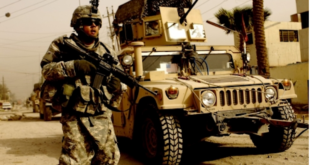MADRID (AFP) — Arab League Secretary General Amr Musa on Thursday threw his weight behind Spanish and European calls for an international conference on the Middle East.
“I invite the participants of this meeting to urge for an urgent international conference for a peace settlement, this time with the United Nations,” Musa told the gathering in the Spanish capital to mark the 15th anniversary of the Madrid Conference which preceded the 1993 Oslo Accords.
“The peace process should not be considered secondary to the fight against terrorism. It must come first,” said Musa, while urging Israel to “work to be a full member of the Middle East society of nations”.
The EU’s External Relations Commissioner Benita Ferrero-Waldner added her voice to the clamour for a new conference as she appealed for the relaunching of the Quartet, comprising the United Nations, United States, the European Union and Russia, to work on a peace settlement.
“A revigorated Quartet has to play a key role,” Ferrero-Waldner said.
She added the EU was ready to play a key role to help develop “a comprehensive regional solution” but stressed ongoing violence would hamper outside efforts, noting the standoff between supporters of Palestinian President Mahmoud Abbas’ Fateh Party and those of the ruling Hamas movement.
“The first priority is to stop violence, the Palestinians must work towards resolving their own internal differences,” Ferrero-Waldner said.
Thursday’s meeting brought together a squadron of European, Arab and Israeli figures, many of whom attended the original US and Russian-sponsored version which paved the way to the Oslo Accords for Palestinian self-government.
Hanan Ashrawi, who in 1991/93 was official spokeswoman of the Palestinian delegation to the peace process and is now a member of the Palestinian Legislative Council, also attended.
“The Palestinian question must not be allowed to continue to fester,” said Ashrawi.
“The tragic irony is that we all know what the solution is. The two-state solution is the only viable solution.
“There is a majority constituency for peace on both sides,” she concluded, urging a settlement on the 1967 demarcation lines encapsulated in UN Resolution 242 of that year.
Ashrawi also warned Europe and other would-be mediators that they “cannot use the election of Hamas as an excuse not to have negotiations.” However, Dalia Rabin, daughter of the former Israeli prime minister Itzhak Rabin, assassinated in 1995 by a Jewish extremist and now chairwoman of the Centre for Israel Studies named after her father, warned she was pessimistic.
“I am afraid Hamas is motivated by extreme Islamist ideology,” Rabin told AFP, urging pressure be brought to bear on the party to recognise Israel’s right to exist.
Former Israeli foreign minister Shlomo Ben-Ami, a key figure in the 2000 Camp David summit talks, lamented the region had become a “cemetary” of failed initiatives.
But he stressed: “Peace is do-able.” Acknowledging historical fault lay on both sides he warned that the past “is often the enemy of the future.” Earlier, former US president Bill Clinton dubbed the original Madrid conference “the beginning of an inspiring political mission” and added in a written statement: “Now is the time to energise regional and international efforts for a comprehensive settlement.” Overnight, Spanish Foreign Minister Miguel Angel Moratinos made an impassioned call for a new international conference which Spain has been lobbying for months.
 Eurasia Press & News
Eurasia Press & News



